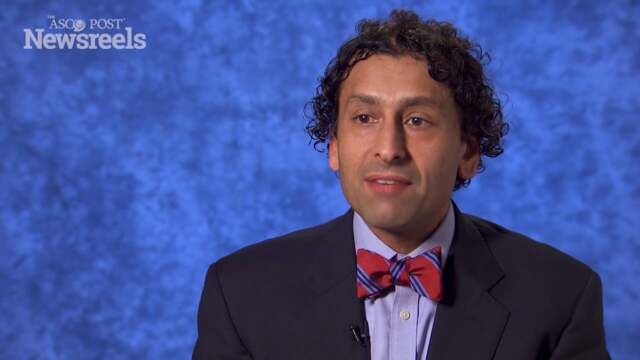Addition of Cetuximab to Concurrent Chemoradiation in Esophageal Cancer
The phase III NRG Oncology RTOG 0436 trial has shown no survival benefit of adding cetuximab (Erbitux) to paclitaxel/cisplatin and radiation therapy in patients with esophageal cancer treated without surgery. These results were reported by Mohan Suntharalingam, MD, MBA, of the Marlene and Stewart...
Bhishamjit S. Chera, MD, on Oropharyngeal Squamous Cell Carcinoma and HPV-16: Expert Perspective
Bhishamjit S. Chera, MD, of the University of North Carolina, discusses quantification of human papillomavirus 16 in circulating tumor DNA during de-intensified chemoradiation therapy for favorable-risk HPV-associated oropharyngeal squamous cell carcinoma (Presentation 92).
ASTRO 2017: Aggressively Reduced Radiation Therapy May Benefit Some Patients With HPV-Related Throat Cancer
For certain patients with oropharyngeal cancer caused by the human papillomavirus (HPV), an aggressive reduction of radiation therapy after surgery may provide cancer control while simultaneously reducing post-treatment side effects, improving quality of life, and lowering treatment costs,...
ESMO 2017: KEYNOTE-040 Evaluates Pembrolizumab in Head and Neck Cancer
Immunotherapy with the checkpoint inhibitor pembrolizumab (Keytruda) may be a better option than standard treatments for patients whose head and neck cancer has spread or recurred after an initial round of chemotherapy, according to results of the KEYNOTE-040 trial presented at the European Society ...
Pembrolizumab in PD-L1–Positive Nasopharyngeal Carcinoma
As reported by Hsu et al in the Journal of Clinical Oncology, pembrolizumab (Keytruda) has shown activity in programmed cell death ligand 1 (PD-L1)–positive recurrent or metastatic nasopharyngeal carcinoma, in a cohort of the phase Ib KEYNOTE-028 trial. Study Details In the study, 27...
Robert I. Haddad, MD, on Head and Neck Cancer: Results of the CheckMate 141 Trial
Robert I. Haddad, MD, of Dana-Farber Cancer Institute, discusses phase III study results on treatment beyond disease progression with nivolumab in patients with recurrent or metastatic squamous cell carcinoma of the head and neck (Abstract 1043O).
Cabozantinib Salvage Therapy in Tyrosine Kinase Inhibitor–Refractory Differentiated Thyroid Cancer
A phase II study has shown that cabozantinib (Cometriq) produces responses in patients with tyrosine kinase inhibitor–refractory differentiated thyroid cancer. The findings were reported by Cabanillas et al in the Journal of Clinical Oncology. MET plays a role in vascular endothelial growth...
Cancer Has Robbed Me of a Life I Loved
I always knew cancer was a real possibility for me. Both my mother and father died of the disease—my mother of lung cancer and my father of bone cancer—so when I started having chronic throat and chest infections, I was diligent about seeking immediate medical attention and felt relieved each time ...
Medical Costs and HPV Vaccination in Oropharyngeal Cancer
According to the Centers for Disease Control and Prevention, human papillomavirus (HPV)-related cancers, including oropharyngeal, vulvar, cervical, vaginal, penile, anal, and rectal cancers, have increased in recent years, with oropharyngeal cancer the most common HPV-related cancer—from 2008 ...
PD-L1 Expression and Radiation Resistance in Head and Neck Squamous Cell Carcinoma
According to a study by Heath D. Skinner, MD, PhD, of The University of Texas MD Anderson Cancer Center, and colleagues, the primary cause of death in patients with head and neck squamous cell carcinoma is local treatment failure. Although human papillomavirus (HPV)-positive head and neck squamous ...
Plasma Epstein-Barr Virus DNA Screening for Nasopharyngeal Cancer
In a Hong Kong study reported in The New England Journal of Medicine, Chan et al found that screening for circulating cell-free Epstein-Barr virus (EBV) DNA is useful in detecting nasopharyngeal carcinoma in asymptomatic individuals. Study Details In the study, 20,174 participants underwent...
Radiotherapy Fractionation for Head and Neck Cancers
An update of the Meta-Analysis of Radiotherapy in Squamous Cell Carcinomas of Head and Neck (MARCH) showed that hyperfractionated radiotherapy maintained a survival advantage over conventional radiotherapy in head and neck cancers. The findings were reported in The Lancet Oncology by Lacas et al. A ...
Pembrolizumab and Cetuximab-Treated Head and Neck Cancer: Activity Confirmed But No Surprises
WITH THE RECENT efficacy findings, improvements in survival, and resultant U.S. Food and Drug Administration (FDA) approvals of programmed cell death protein 1 (PD-1) immune checkpoint inhibitors across multiple solid tumor indications, the publication of yet another positive trial adds to the...
Pembrolizumab Is Active in Platinum- and Cetuximab-Refractory Head and Neck Cancer
IN THE PHASE II KEYNOTE-055 trial, pembrolizumab (Keytruda) was found to produce durable responses in patients with platinum- and cetuximab (Erbitux)-refractory head and neck squamous cell carcinoma.1 Results of the trial were reported by Joshua Bauml, MD, of the University of Pennsylvania,...
NCCN Panelists Relay ‘What’s Hot’ in Their Fields
AT THE NATIONAL Comprehensive Cancer Network® (NCCN®) 22nd Annual Conference, experts from several fields met with journalists to highlight “what’s hot” in their specialties. The ASCO Post captured that conversation. Myeloproliferative Neoplasms Guidelines NCCN HAS LAUNCHED new NCCN Clinical...
Outcome by Age With Lenvatinib in Radioiodine-Refractory Differentiated Thyroid Cancer
As reported in the Journal of Clinical Oncology by Brose et al, a prespecified analysis of the phase III double-blind SELECT trial of lenvatinib (Lenvima) vs placebo in radioiodine-refractory differentiated thyroid cancer showed progression-free survival benefits in both older and younger...
PD-L2 Expression and Clinical Response to Pembrolizumab in Head and Neck Cancer
A study assessing the prevalence and distribution of programmed cell death ligand 2 (PD-L2) in human tumor samples across seven cancer indications, including renal cell carcinoma, bladder, melanoma, non–small cell lung cancer, triple-negative breast cancer, gastric carcinoma, and head and...
Optimizing Quality of Life in Head and Neck Cancer Survivors
Head and neck cancer can take away a patient’s “right to feel human,” and its impact on physical appearance, physical functioning, and general quality of life can be devastating, according to Merry Sebelik, MD, Associate Professor of Head and Neck Surgery at Emory University in Atlanta. At a...
Proton Therapy Associated With Fewer Sequelae in the Treatment of Head and Neck Cancer
Radiation oncology is vital to the management of patients with cancer of the head and neck, and for certain patients, proton therapy may offer significant benefit over intensity-modulated radiation therapy, according to Walter J. Curran, MD, Executive Director of the Winship Cancer Institute of...
Targeted Therapy in the Age of Immunotherapy in Head and Neck Cancer
The impact of targeted therapies in head and neck cancer has been limited, but we can strategize to integrate the development of targeted and immunotherapeutic agents, according to Christine H. Chung, MD, Senior Member and Chair in the Department of Head and Neck-Endocrine Oncology at Moffitt...
New Horizons in Immunotherapy for Head and Neck Cancer
Immunotherapy is a new treatment paradigm in recurrent metastatic head and neck cancer, according to Nabil F. Saba, MD. At a symposium hosted by the Winship Cancer Institute and Emory University—Updates in the Management of Head and Neck Cancer—Dr. Saba discussed current research and new...
Maura L. Gillison, MD, PhD, on HPV and the Value of the Vaccine
Maura L. Gillison, MD, PhD, of The University of Texas MD Anderson Cancer Center, discusses her findings on the impact of prophylactic human papillomavirus vaccination on oral HPV infections among young adults in the United States. (Abstract 6003)
Waun Ki Hong, MD, FACP, Helped Change the Standard of Care in Laryngeal Cancer, Now Focuses on Chemoprevention and Precision Medicine
Waun Ki Hong, MD, FACP, one of the nation’s leading experts in head and neck and lung cancers, was born in South Korea and grew up in a tiny village outside the nation’s capital of Seoul. Number six of seven siblings, Dr. Hong described his early life in the cozy village as blissful, until the...
Complications From Thyroid Cancer Surgery More Common Than Once Thought
As thyroid cancer rates rise, more patients are having surgery to remove all or part of their thyroid. A new study by Papaleontiou et al in The Journal of Clinical Endocrinology & Metabolism suggests complications from these procedures are more common than previously believed. Overall, 6.5% of ...
European Commission Approves Nivolumab for Head and Neck Squamous Cell Carcinoma Progressing After Platinum Therapy
On April 28, 2017, the European Commission approved nivolumab (Opdivo) as monotherapy for the treatment of squamous cell carcinoma of the head and neck (SCCHN) in adults with disease progression on or after platinum-based therapy. Nivolumab is the first and only immuno-oncology treatment that has...
Expert Point of View: Denise A. Galloway, PhD
Denise A. Galloway, PhD, Associate Director, Human Biology Division, Fred Hutchinson Cancer Research Center, Seattle, whose research focus is human papillomavirus (HPV), told The ASCO Post that these findings provide new data for the field. “I can’t think of a large study of oral HPV infection in...
Rates of Oral HPV Infection Plummet After Vaccination
Vaccination against the human papillomavirus (HPV) reduced the risk of acquiring oral HPV infections by 88%, in one of the first large studies to explore vaccination’s impact in the oropharynx. The study will be presented at the 2017 ASCO Annual Meeting, and the findings were released in advance of ...
USPSTF Recommendation on Screening for Thyroid Cancer
As reported in JAMA, the U.S. Preventive Services Task Force (USPSTF) has recommended against thyroid cancer screening in asymptomatic individuals. The current USPSTF statement is an update of a 1996 USPSTF recommendation statement. The recommendation was based on task force review of evidence on...
PD-L1 Expression and Radiation Resistance in Head and Neck Squamous Cell Carcinoma
According to a study by Skinner et al, the primary cause of death in patients with head and neck squamous cell carcinoma is local treatment failure. Although human papillomavirus (HPV)-positive head and neck squamous cell carcinoma is sensitive to radiation, HPV-negative tumors are...
European Commission Approves Nivolumab for Head and Neck Squamous Cell Carcinoma Progressing on or After Platinum-Based Therapy
On April 28, the European Commission approved nivolumab (Opdivo) as monotherapy for the treatment of squamous cell carcinoma of the head and neck (SCCHN) in adults with disease progression on or after platinum-based therapy. Nivolumab is the first and only immuno-oncology treatment that has...
Reduced-Dose Radiotherapy for HPV-Positive Oropharyngeal Carcinoma
A phase II trial conducted at the University of California at Davis and at Los Angeles showed good outcomes with reduced-dose radiotherapy in patients with human papillomavirus (HPV)-positive oropharyngeal squamous cell carcinoma. These findings were reported in The Lancet Oncology by Chen et al....
Higher Rates of Bone Metastases and Increased Risk of Death in Follicular and Medullary Thyroid Cancer
In the largest-known study on bone metastases in thyroid cancer, researchers at the University of Michigan Comprehensive Cancer Center found that patients with follicular and medullary thyroid cancer had the highest rate of cancer-related bone lesions and fractures and an increased risk of death....
Addition of Buparlisib to Paclitaxel in Squamous Cell Carcinoma of the Head and Neck
In the phase II BERIL-1 trial reported in The Lancet Oncology, Soulières et al found that adding the pan-PI3K (phosphatidylinositol 3-kinase) inhibitor buparlisib to paclitaxel improved outcomes in patients with platinum-pretreated recurrent metastatic squamous cell carcinoma of the head and neck....
Better Vision Function May Be Related to Better Quality of Life in Patients With Head and Neck Cancer
Better vision function seems to be related to better quality of life after treatment for head and neck cancer, particularly among patients who have had surgery, according to Hsiao-Lan Wang, PhD, RN, Assistant Professor in the College of Nursing at the University of South Florida. Head and neck...
Deintensifiying Treatment of HPV-Positive Oropharyngeal Cancer Could Reduce Toxicity While Maintaining Function and Survival
“The status quo for HPV [human papillomavirus]-associated oropharyngeal squamous cell carcinoma is not sufficient.… Our treatment is effective, but the toxicity associated with it is not tolerable.” And HPV-associated oropharyngeal cancer “is a cancer of relatively younger patients,” said Nishant...
New ASTRO Guideline Establishes Standard of Care for Curative Treatment of Oropharyngeal Cancer With Radiation Therapy
The American Society for Radiation Oncology (ASTRO) has issued a new clinical guideline for the management of oropharyngeal cancer. The guideline, “Radiation therapy for oropharyngeal squamous cell carcinoma: An ASTRO Evidence-based Clinical Practice Guideline,” was published by Sher et ...
Trends in Thyroid Cancer Incidence and Mortality in the United States
In a study of Surveillance, Epidemiology, and End Results-9 (SEER-9) data reported in JAMA, Lim et al found that both thyroid cancer incidence and mortality have increased over recent decades, reflecting increases in papillary thyroid cancer incidence and mortality. These findings suggest that the...
Pembrolizumab in Platinum- and Cetuximab-Refractory Head and Neck Cancer
In the phase II KEYNOTE-055 trial, pembrolizumab (Keytruda) was found to produce durable responses in patients with platinum- and cetuximab (Erbitux)-refractory head and neck squamous cell carcinoma. Results of the trial were reported by Bauml et al in the Journal of Clinical Oncology....
David G. Pfister, MD, on HPV and Head and Neck Cancer
David G. Pfister, MD, of Memorial Sloan Kettering Cancer Center, discusses the link between human papillomavirus and oropharyngeal cancers and what is known about the effect of HPV on treatment response and outcome.
Delays in Radiotherapy for Head and Neck Cancer in Insured and Indigent Populations
In a study reported in the Journal of Oncology Practice, Thomas et al found that interruption of radiotherapy for head and neck cancer was more frequent and treatment outcomes were poorer among indigent populations vs commercially or Medicare-insured populations within a single academic health...
Developing Better Multidisciplinary Strategies
“More than any other disease, head and neck cancer requires constant interplay between a number of different specialties,” Sandeep Samant, MD, Chief, Head and Neck Surgery, Northwestern Medicine, and Chair of the Multidisciplinary Head & Neck Symposium sponsored by the Robert H. Lurie...
Making the Case for Sentinel Node Biopsy in Early Cancers of the Oral Cavity
“The majority of patients with oral cavity cancers will undergo an unnecessary operation,” Sandeep Samant, MD, stated at a session on managing N0 neck cancer at the 2016 Lurie Cancer Center Multidisciplinary Head & Neck Symposium in Chicago.1 That operation is elective neck dissection, and it ...
Expert Point of View: Cornelius J.M. Melief, MD, PhD
Cornelius J.M. Melief, MD, PhD, Emeritus Professor at Leiden University Medical Center in the Netherlands and Chief Scientific Officer at ISA Pharmaceuticals, noted that toll-like receptors (TLRs) are useful in promoting immune activation in a variety of leukocytes and that the signaling pathways...
Novel Immunotherapy Added to Standard Care Did Not Meet Endpoint in Patients With Advanced Head and Neck Cancer
In the phase II Active8 trial, a novel immunotherapy agent, motolimod, failed to improve outcomes over chemotherapy plus cetuximab (Erbitux) in patients with recurrent or metastatic squamous cell carcinoma of the head and neck. In a post hoc analysis, however, patients with injection-site...
Immunotherapy for Head and Neck Cancer: ‘The Fourth Modality Has Arrived’
“This is a big deal. This is going to change all of oncology, not just head and neck cancer,”1 Tanguy Seiwert, MD, remarked following a summary by Jeffrey Sosman, MD, on advances in immunotherapy for treating cancer.2 Dr. Sosman, Director of the Melanoma Program and Clinical Director of Cancer...
ASCO Endorses ACS Head and Neck Cancer Survivorship Care Guideline
As reported in the Journal of Clinical Oncology by Larissa Nekhlyudov, MD, MPH, of Brigham & Women’s Hospital, Harvard Medical School, and colleagues, ASCO has endorsed the 2016 American Cancer Society (ACS) guideline on head and neck cancer survivorship care. The endorsement was based on ...
Effect of Adjuvant Chemoradiotherapy in Resected Locally Advanced Head and Neck Cancer
In a study of National Cancer Database data reported in the Journal of Clinical Oncology, Trifiletti et al found that adjuvant chemoradiotherapy was associated with a survival benefit in patients with resected locally advanced head and neck cancer with negative surgical margins and no extracapsular ...
Expert Point of View: Philip Poortmans, MD, PhD
Philip Poortmans, MD, PhD, President-Elect of the European CanCer Organisation (ECCO) and Head of the Radiation Oncology Department at Radboud University Medical Center in Nijmegen, the Netherlands, commented: “This research provides good evidence for the benefits of treating advanced-stage head...
Twice-Daily Radiation Therapy May Reduce Mortality in Head/Neck Cancer
Treating patients with head and neck cancer with hyperfractionated twice-daily radiation therapy combined with chemotherapy may potentially reduce mortality, according to new research presented by Claire Petit, PhD, and colleagues at the 2017 European Cancer Congress (ECCO).1 The study included...
Protein Component of the Epstein-Barr Virus May Promote the Development of Cancer
After an infection with the Epstein-Barr virus (EBV), the virus persists in the body throughout a person's lifetime, usually without causing any symptoms. About one-third of infected teenagers and young adults nevertheless develop infectious mononucleosis, which usually wears off after a few weeks. ...




